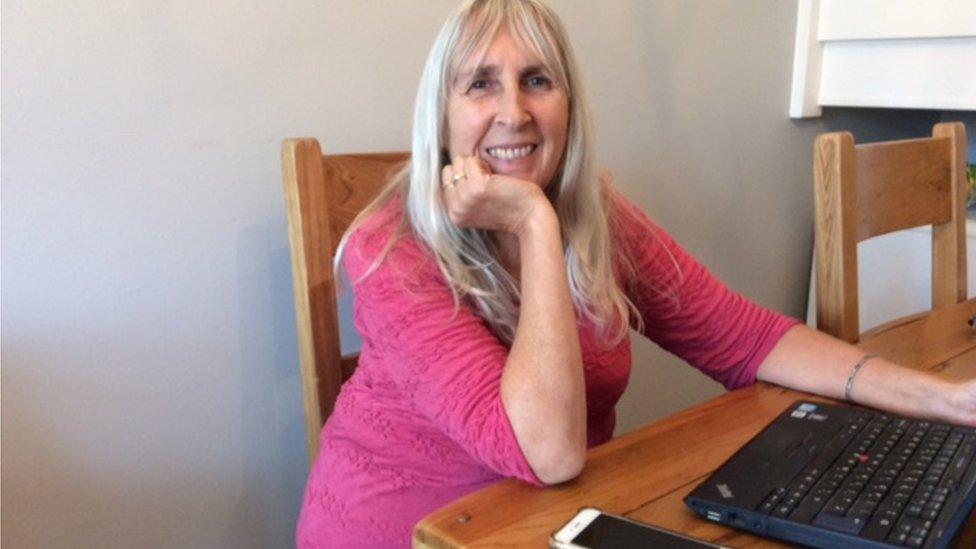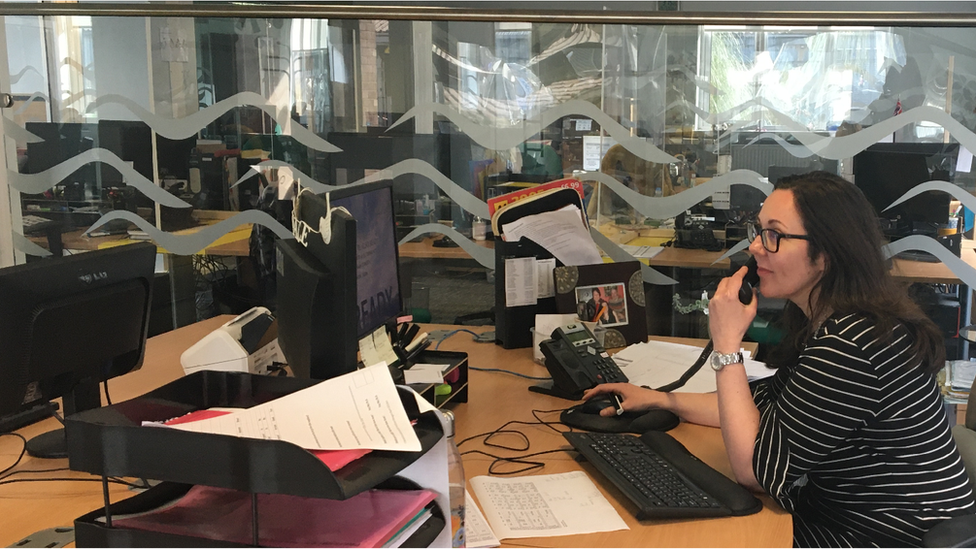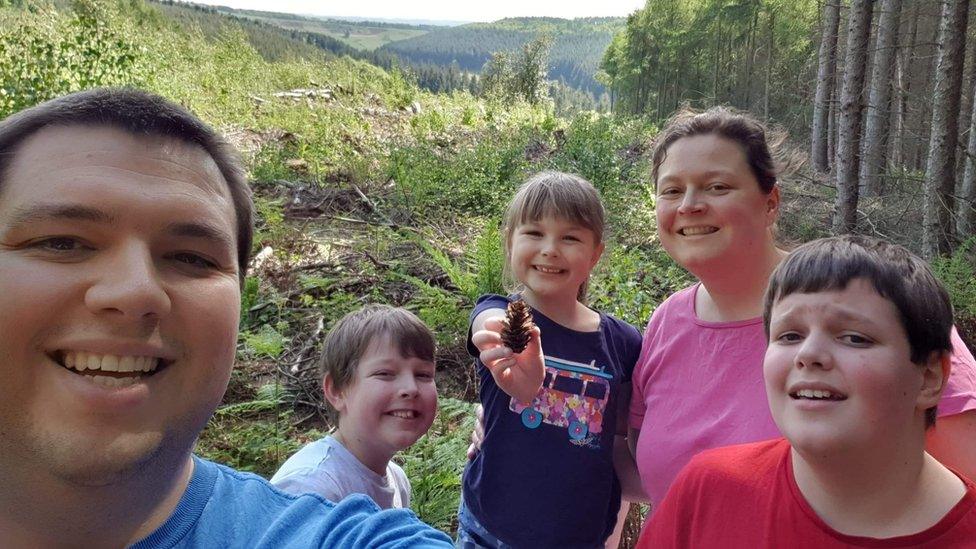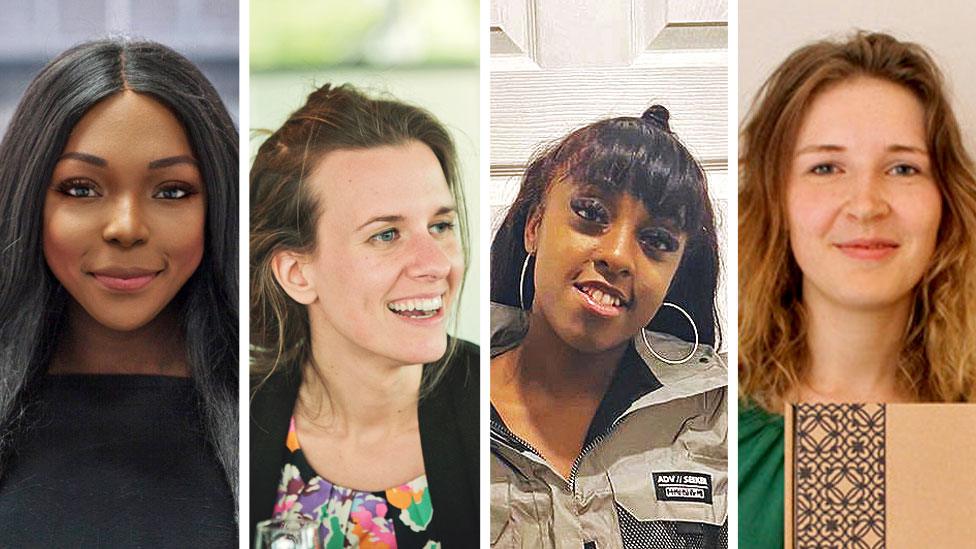Coronavirus: 'We have next to no income. There is no help for us'
- Published

Sonia Hawkins says more jobs will now have to go
Chancellor Rishi Sunak admitted last week that his latest coronavirus economic support package won't save all jobs. But as employers and employees digest the latest plans it's clear many of them feel viable firms are being hung out to dry just as the economy faces the impact of further lockdown measures.
The support plan, involving ending the furlough scheme and shifting more of the financial burden from the taxpayer and onto employers, has broad support from the CBI and TUC. But many firms say the government has simply withdrawn a lifeline. The BBC spoke to four people who feel things just got worse.

'Companies like ours are hanging on by their fingertips'
"We have struggled all the way through - and now this," says an exasperated Sonia Hawkins. "We have done everything right and followed the rules. But there is no help for us."
In 2019, her family-run music and lighting equipment hire firm had its best year since it was set up as a mobile disco business in 1978. "Now we've had the rug pulled from under us," she says.
After the furlough scheme ends, the Treasury will instead subsidise people who worked at least a third of their usual hours.
"We have next to no income. We've got people on furlough. We would have to bring them back and pay them just to get a subsidy. It's nuts."
The company, Disco Equipment Hire, external, serves many areas that went into deep freeze during lockdown: big parties, weddings, conferences.
Sonia said that after the firm's "phenomenal" 2019, they invested heavily in expanding - new equipment and transport. "Luckily, we had enough money to survive during the lockdown," she said. "In June, we invoiced for just £50."
A few weeks ago Sonia was hopeful that business was starting to pick up. Now she fears that two more staff will have to go, in addition to the five already made redundant - leaving just the four family members plus an additional employee.
"We were praying that the chancellor was going to come out with something for us - grants, more furlough assistance.
"Our bills don't stop," she said. "Companies like ours are hanging on by their fingernails."


Maria has just been told her hotel job is at risk of being cut
'There's no work around. I'm not even getting responses'
Maria - she did not want her surname disclosed - had already survived one round of redundancies at the large hotel where she works. But Maria's employer has just warned her job is at risk in a new round of cuts.
"I'm fearing the worse," says the sales manager. "My job was certainly viable. I brought in the most revenues for the business."
Maria works in a city-centre hotel - part of a big chain.
"The hotel manager has been trying to keep things afloat," she said. "But as everyone knows, people aren't going into the cities any more."
"We've gone from about 110 staff to 20. The people there are doing a bit of everything now - trying to keep things going with as few staff as possible."
Maria said everyone was banking on an extension to the furlough scheme: "I think we all felt that it would be enough for help us through the next few months."
She's still hoping for the best. Maria has been at the hotel for four years, and with the group for 12 years. "They know my capabilities, that I'm good at my job."
She's hoping to hear about her future within the next week. Even so, Maria has been firing off her CV in the search for other jobs in sales and business management.
It's been dispiriting: "There's no work around. I'm not even getting responses."


Nicky Whyman says her firm can weather the crisis - but times are tough
'A lot of our competitors have already gone into liquidation'
After six months of zero income, events company KDM spotted signs of life in the sector in early September. Business activity started to pick up, says manager Nicky Whyman.
Bookings in the first week of September were only 10% of monthly activity pre-lockdown, but it was a sign for optimism. That has since evaporated after fresh lockdown measures.
She says: "As the economy started to open up, we were gearing up for small events - socially distanced, indoors and outdoors. But companies now say they cannot commit to any in-person events until mid-2021 at the earliest." That would mean 12-15 months of being unable to operate due to government restrictions.
The firm, which cut eight jobs earlier during lockdown, brought back the remaining 18 staff to work part-time this month. "But then the government announced it was scrapping the pilots of larger business events and would no longer look at reopening of conference centres and exhibitions.
"When the furlough ends next month we are in the same situation as we were in April, except that there will no longer be government support for us or the wider events industry at all.
"The way the government has structured the new support package means we are being asked to bring people back from furlough just so we can claim the [pay] subsidy - great in theory for employees, but illogical and expensive for employers.
"We are being asked to pay staff the necessary 55% of their salaries for 33% of working hours. The numbers just don't add up."
Founded in 1990, KDM's operations stretch from organising conferences to team-bonding experiences, external, working exclusively for the corporate market. Its events can involve 2,000-plus people. The firm is confident it can weather the storm, but things are tough.
"We are using cash reserves to keep paying staff and not have to make staff redundant. But we can't continually drain the coffers."
She says the chancellor should have extended the furlough scheme for specific industries that are currently barred from operating. "It is difficult to see many viable companies surviving without targeted support."
Nicky says the events industry, worth £70bn to the economy, has proposed ways to operate safely, but is being ignored. "If the government would only work with us we could start to get business moving in a safe and secure manner. A lot of companies within our sector have already gone into liquidation."


Lisa's firm was banking on a boost from Christmas and New Year celebrations
'There are no jobs. It's terrifying'
Lisa, on furlough since March, had been cautiously optimistic about returning to work over the next few weeks. With Christmas coming, the events sales manager was expecting seasonal parties to bring in some business.
"Now all the rules have been tightened I'm not expecting to go back to work any time soon," she says. Indeed, she's now not at all hopeful of ever returning to her job. "Work has all but vanished for my work since Covid."
Lisa does not want to disclose her surname nor employer for fear of saying anything to jeopardise future work. "We have gone through a consultation period for redundancies. I've just no idea what is going to happen.
"The latest jobs support scheme does nothing to help those of us on furlough. I have been brought back one day a week, but what is happening now gives my employer no incentive to give me more days," Lisa adds.
She hopes her employer might allow her to take unpaid leave until March, but there has been no decision.
With her partner only working part-time after being furloughed, she worries about paying the bills and providing for her children. "It's terrifying."
Domestic costs have been cut to a minimum. When in jobs, they needed two cars for their work. Now one sits on the driveway, uninsured because they can't afford the premium.
Aged 40, Lisa has worked in the hospitality industry since she was 16. She says: "I have a lot of experience and have been applying for other jobs. I have searched and searched for different jobs since March. But there's nothing."
She's not bitter, just scared about the future. "I can understand what Mr Sunak is trying to do [to help the economy]. But it is so difficult for us. He doesn't seem to have done anything [last week] that will help people like me.
"The government has said the new [social distancing] rules may be in place for six months. In that case, they should have extended the furlough scheme for six months."

SOCIAL DISTANCING: What are the rules now?
SUPPORT BUBBLES: What are they and who can be in yours?
FACE MASKS: When do I need to wear one?
TESTING: What tests are available?

- Published29 September 2020

- Published26 August 2020

- Published15 September 2020

- Published26 November 2020
